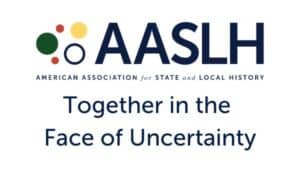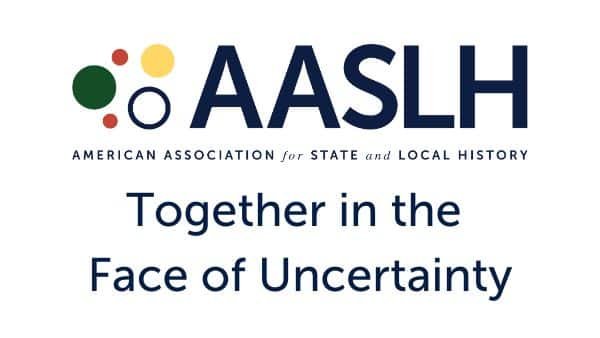
Over the past two weeks, I’ve heard from colleagues throughout the history community expressing their distress about impending challenges to the work they do. While we don’t yet know what the full impact of recent White House actions will be for our field, they have already created a sense of confusion and concern that is straining history organizations nationwide.
From your professional association—your home for history—I’m writing to you today to share how we at AASLH are interpreting recent White House actions, how we’re working to protect and advance the interests of the field, and what steps the public history community can take.
Perhaps the biggest immediate effect of recent executive actions has been the sense of unease they have caused across our field. For example, while the executive branch rescinded its memo temporarily freezing federal funding, it is still unclear if or how current and future grants from the National Endowment for the Humanities, Institute for Museum and Library Services (IMLS), and other federal agencies will be affected. We also do not know if proposed dramatic changes to the Department of Education will impact history organizations.
What we do know is that these federal agencies provide vital funding to our field and have done so for decades. The loss of funding adds a financial burden on our field and puts at risk the educational, economic, and quality-of-life benefits our organizations bring as key community assets. Our nation has more than 21,000 history organizations, across every Congressional district, and many are in need of support to continue serving their communities. AASLH is advocating for the retention of this federal funding, and we encourage you to join us in this effort.
Meanwhile, AASLH staff and I have read with great concern the recent executive orders from President Trump that promote a narrow, incomplete view of history, commemoration, and patriotism. One undermines effective and accurate K–12 history education and the other promotes an exclusively celebratory observance of the U.S. 250th anniversary. Both orders hinder our field’s efforts to deepen public engagement with the rich, complex story of American history.
The history community should reject efforts to define patriotism as the unalloyed celebration of America. That approach to history runs counter to our field’s best practices and the message AASLH has shared for nearly a decade in the lead-up to the nation’s Semiquincentennial: our field is at its best when we share the whole history of our communities, states, and nations. As we approach the nation’s 250th and beyond, history organizations must remain committed to building historical understanding by advancing critical thinking skills, embracing complexity, and exploring the full sweep of the American past.
I understand that these executive actions make this a difficult time for the history field. Here are the steps AASLH is taking to support you:
- We remain committed to our values and strategic vision, and we’ll continue to offer trainings, resources, events, and more to strengthen the history community through opportunities for continued learning and mutual support.
- We support the American Alliance of Museums (AAM) and its call for “resilience through unity.” AASLH will be at AAM’s Museums Advocacy Day to call for preserving and promoting museum funding and to highlight the 250th as chance to advance a more widely shared, evidence-based picture of American history.
- We have endorsed the joint statement from the American Historical Association (AHA) and Organization of American Historians (OAH) against the executive order on K–12 education; we share AHA and OAH’s belief that, despite the executive order’s title, the order represents a narrow view of our history and a restrictive definition of patriotism.
- We continue to stay engaged with colleagues in Washington, D.C. and across the nation to understand how recent actions are affecting the history community, and we are prepared to keep the field updated and respond accordingly.
And here’s what you can do:
- Fill out AASLH’s short survey on how changes to federal funding are affecting your organization. We’ll use this information to gain a better sense of where help is needed most.
- Take IMLS’s National Museum Survey to ensure that we have recent, accurate data about the characteristics and needs of our field.
- Use AAM’s form to contact your members of Congress to express your concerns about potential indiscriminate staffing cuts at IMLS that could severely weaken its ability to fulfill its mission and support our field.
- Participate in Museums Advocacy Day, even if you can’t make it to D.C. You can sign up for AAM advocacy alerts to get involved.
- Reach out to your representation in Congress to share information about your history organization and how it’s been affected by recent executive actions.
Without knowing exactly what lies ahead, as a field we must remain nimble, collaborative, and steady. Rest assured that AASLH stands ready to support history practitioners and organizations across the nation in the face of these challenges to our work. Working together, we can continue to promote the value of history organizations and help Americans learn and use our whole history.
Sincerely,
John R. Dichtl
AASLH President & CEO
Share this content:
